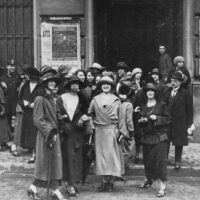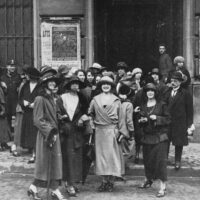000
100
%
Gender and Society

Présentation
Closely linked to the study of social practices and lived experience, the preferred analytical framework here involves the use of chronologies specific to the objects studied, ranging from the eighteenth to the early twenty-first century.
The field develops four thematic domains in the midst of the renewal of French and international women’s and gender history, approached on different scales – local, national, transnational – and in a geographical framework that goes beyond Europe and encompasses the Mediterranean, the Americas, and the French and British imperial spaces.
The synergy between research and teaching is built around the pioneering Matilda Master’s programme, ‘History of women and gender in Europe from the eighteenth to the twentieth century’, as part of the Master’s programme in Gender Studies and in partnership with the universities of Vienna, Sofia, Ruhr-Bochum, Padua and Central European University.
Each year, the ‘Gender and Society’ seminar addresses one or more themes identified collectively by the members of the division.
The historical approach to gender taken in this area focuses on the construction of the respective positions of men and women in past societies, and on the perception that the protagonists have of the gendered roles assigned to them.
Thématique 1
Age, Work and Care
This theme combines the history of paid and unpaid work in workshops and factories, in the domestic sphere, and in care institutions, with an analysis of age and the life cycle of women and men. One sub-theme focuses on the gendered organisation of work and on female self-employment, from entrepreneurship to intermittent and illicit work. The labour market is approached partly through the study of short- and long-distance labour migration by women as well as through wage negotiations and their gender implications.
In a second sub-theme, two complementary and interconnected aspects of domestic and care work are addressed: (1) care occupations and professions, and (2) the study of uses of time and distributions of care and household tasks within families.
This theme shares questions developed in ‘Regulation’.
Thématique 2
Norms, Institutions and Deviance
The research carried out in the bracket of this theme addresses both norms and their infringement and, more specifically, the gendered practices of the administration and the experiences of those being administered (consent, avoidance strategies, agency, marginality, micro-sanction). The forms and norms of gendered assistance are studied in prisons, psychiatric institutions, schools, hospitals, and hostels.
More broadly, particular attention is paid to sexuality education and sexual minorities, the education of young people and children, and juvenile deviance.
A specific sub-theme focuses on the family as a social and economic institution affected by gender dynamics. Analysis of the normative framework of the family institution goes hand in hand with that of the conflicts, breakdowns and violence within it (marriages, separations, divorces).
The seminar, ‘Families and individuals in Europe from the modern era to the present day’, is designed to complement this sub-theme.
Thématique 3
Arts and Visual Cultures
The intersection of gender studies, social history, and art history is leading to the development of new methods for the interpretation of social hierarchies, the history of bodies and appearances, the construction of masculinities, and the processes of political emancipation that took place throughout the nineteenth, twentieth and twenty-first centuries (artistic and technical training, networks of sociability, institutionalisation, dissemination of objects and knowledge, material culture, media). Visual cultures studied through the prism of gender are examined not only as illustrations of social reality, but also as an engine of forms of identification and of the capacity to act in the context of social precepts. Specific areas of research focus on the visual study of artistic masculinities and non-normative gender identities, and on the physiognomic study and representations of the body of deviants, with particular emphasis on the recognisable quality of delinquency in the face and body.
The theme intersects with certain sub-themes of ‘Arts, Imagery, Society’.
Thématique 4
Activism
At the heart of this theme is an interest in political and social movements (feminist, religious, student) and the study of gendered forms activism and social engagement. The transnational and post-colonial dimensions of activism, as well as its regional and national dimensions, are also addressed within this theme.
A first sub-theme examines the links between women, gender and Catholicism, and more specifically Catholic women and the social and cultural change they face, particularly in the field of sexuality. A second sub-theme looks at women’s movements between colonialism and decolonisation. A third sub-theme looks at the gendered dimension of militant protest and its evolution, including environmental struggles and ecofeminism.
The themes in the area, ‘Conflict’, share many of the issues addressed in studies of gendered activism.
